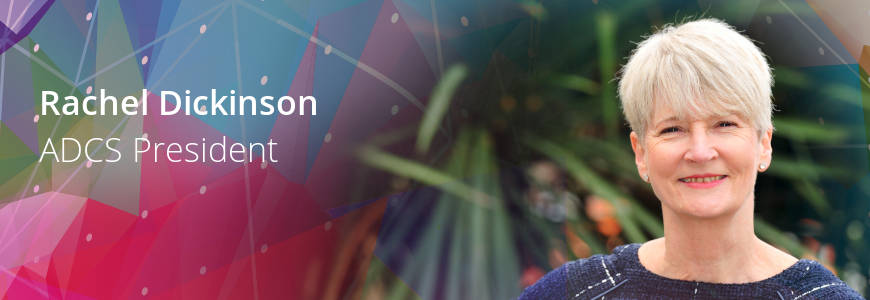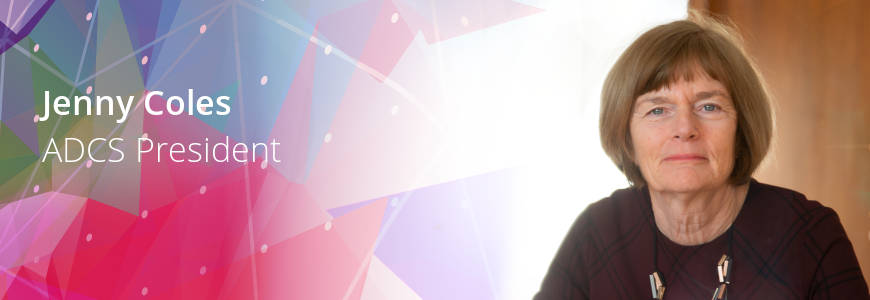Jenny Coles Inaugural Address PR

“I hope Covid-19 makes us a kinder country, a country that works for all children”
Today, Thursday 23 April, the Association of Directors of Children’s Services, published the written inaugural address of its new President for 2020/21, Jenny Coles, Director of Children’s Services, Hertfordshire County Council.
Jenny Coles used her address to outline the Association’s policy priorities for the coming year, with maintaining “visibility on the need to level up…society to make it more inclusive” so that children and young people, particularly the most vulnerable, feel a greater sense of belonging at home, in school and in their community topping the list.
Reflecting on Covid-19, Jenny Coles paid tribute to local government staff, public services and local politicians “for their amazing work” and acknowledged that there are “even greater expectations of local government” than usual because of the outbreak. The pandemic will likely “plunge even more children and their families into poverty” as many more families experience the “wholly inadequate provisions of the welfare state.” Keeping “poverty high on everyone’s agenda” will be a continuing priority for ADCS in the coming year, she said.
She went on to highlight some of the challenges that children and young people might face when we return to “benign times” and the pressures being “stored up” for already “severely stretched and woefully underfunded” children’s services. The implications of Covid-19 will be “most profound” for children and young people who are facing months of lost socialisation and learning due to school closures, for some social isolation will be “compounding and exacerbating their worries and anxieties”, she said. It’s possible we’ll see “huge spikes in demand across the children’s social care spectrum”, a backlog of new care applications and more children needing to come into care as well as increased incidences of children living with one or more of the ‘trigger trio’, parental substance misuse, domestic abuse and parental mental ill-health resulting in “even greater burdens on child and adolescent mental health services” which were “almost at breaking point” before Covid-19, she said. Local authorities and their partners will be grappling with these things and more as we continue our work around recovery.
That said, we’ve also seen the “extraordinary outpouring of gratitude for frontline carers” and the ‘hidden frontline’, from our social workers and foster carers to residential children’s homes workers and staff in residential school settings. We have seen clearly the vital role of the local authority as a leader of place “building, maintaining and strengthening local relationships in local communities” and the “reaffirmation of the strong partnerships that exist between the local authority and schools”, she said. She continued, “I sincerely hope the spirit of working together continues long after the pandemic is over in the best interests of communities but, crucially, in the best interests of children and young people… I also hope that the DfE will review its own internal structural arrangements to eradicate the artificial divide, which only exists in central government, between education and schools and children’s social care.”
On placements for children in care
“I am more determined than ever to work closely with DfE, other government departments and with providers to achieve a national sufficiency strategy of placements for children in care…I include in this the imperative of resolving our national and long-standing shortage of tier 4 placements for our most complex children and young people…This is not solely about providing a decent, safe placement in which to live, it’s about understanding wider support needs too – staying connected with family and friends, emotional support, physical and mental health support, an educational placement that encourages a sense of belonging. If the state is going to take a child or young person into care, we have a collective responsibility to try to meet a child’s needs holistically…Similarly, I am determined to ensure that a national placement sufficiency strategy considers carefully the accommodation and support needs of care leavers.”
On the care review
“It will be important for the Care Review to have a sharply focussed, clear aim of improving outcomes for children in care and care leavers. The aim of the review cannot be clouded by any sense of seeking to reduce the number of children in care per se; the trick is to make sure we have the right children in care, at the right time, in the right placement with the right support. Necessarily this will involve a careful look at the host of issues associated with ‘placements at distance’. In recent times we have seen an increased use of placements at distance, indeed we’ve seen increased use of unregulated and unregistered provision. To state the obvious if I may, both phenomena are driven by a lack of placement sufficiency in localities… I want to say again here that semi independent accommodation usually used by and for care leavers may be unregulated by Ofsted, but it is not the wild west where children are abandoned to their fate. These placements are locally monitored. There is some poor practice that we absolutely don’t want to see, but unless the state accepts that it (not just local authorities) has a role to play in ensuring placement sufficiency across the country then local authorities will continue to be stuck between a rock and a hard place.”
On children’s services funding
“The announcement of extra funding for children (and adult) social care is welcome. But I just want to say loud and clear, this is not yet job done for children’s services…We must work towards a sustainable long term funding settlement for children’s services. Before the pandemic, children’s services were woefully under-funded and stretched to the limit. The current crisis is significantly exacerbating that inadequate baseline of funding. The resources needed during the nation’s recovery from the pandemic will be eye-wateringly large. I’m sure that the government will invest in its citizens’ futures. I want to see unprecedented levels of investment in our children’s futures, please.
“We have a government with a large mandate…This gives the government the opportunity to change its approach – to stop chasing the next shiny new thing and instead invest in children’s services in a way that generates improved outcomes for children and families over a longer timeframe. Short term, single issue funding pots waste precious time in endless bidding rounds for small amounts of money when our core services for children and families are under-funded. I hope that the government will see that it cannot again allow public services to be denuded in the way they have been over the last decade.”
ENDS
The Association of Directors of Children’s Services (ADCS) Ltd is the professional leadership association for Directors of Children’s Services and their senior management teams in England.
Related Articles
Stuart Gallimore comments on a HMI Prisons and HMI Probation report on youth...
In General
Charlotte Ramsden comments on DfE guidance on full opening of schools
In General
ADCS response to the Public Accounts Committee report on children’s social...
In General
Stuart Gallimore comments on the Marmot Review: 10 years on report
In General
ADCS responds to the APPG report on children missing from out of area placements
In General
All behaviour is a form of communication. Children and young people may not...
In General
Comment on local authority statutory duties in relation to children
In General
Commenting on the Children’s Social Care Innovation Programme Round 2 Final...
In General
ADCS Policy Position Paper - A Country That Works For All Children
In General
Commenting on a report by the OCC into vulnerable babies in England
In General
Due to its unfamiliarity and unpredictability, the pandemic is clearly a...




